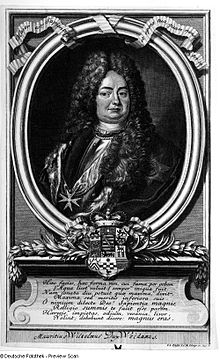Moritz Wilhelm, Duke of Saxe-Zeitz
| Moritz Wilhelm | |
|---|---|
| Duke of Saxe-Zeitz | |

Engraving, c. 1717-18
|
|
| Born |
12 March 1664 Schloss Moritzburg, Zeitz Saxony |
| Died | 15 November 1718 (aged 54) Osterburg Castle, Weida |
| Noble family | House of Wettin |
| Spouse(s) | Marie Amalie of Brandenburg |
| Father | Maurice, Duke of Saxe-Zeitz |
| Mother | Dorothea Maria of Saxe-Weimar |
Moritz Wilhelm (English: Maurice William; 12 March 1664 – 15 November 1718), a member of the Saxon House of Wettin, was the second and last Duke of Saxe-Zeitz from 1681 until his death.
He was born at Moritzburg Castle in the Wettin residence of Zeitz, the eldest son of Duke Maurice of Saxe-Zeitz (1619–1681) and his second wife, Dorothea Maria (1641–1675), a younger daughter of the Wettin duke Wilhelm of Saxe-Weimar. Duke Maurice had received the secundogeniture of Saxe-Zeitz from the hands of his father, Elector John George I of Saxony in 1652 and had Moritzburg Castle erected as his residence. He had two sons from his first marriage, but both died in infancy long before Moritz Wilhelm's birth.
Moritz Wilhelm received a comprehensive education, mainly in ancient languages and theology; in 1681 he met with Philipp Spener during his Grand Tour in Frankfurt and in his later years kept up a fruitful correspondence with the philosopher Gottfried Wilhelm Leibniz. The sixteen-year-old succeeded as duke of Saxe-Zeitz upon the death of his father on 4 December 1681. However, he had to accept the guardianship of his Wettin cousin Elector John George III until 1684.
The relationship with the Saxon electors remained tense, similar to the other Wettin secundogenitures of Saxe-Weissenfels and Saxe-Merseburg. Suspiciously eyed by his cousins, Moritz Wilhelm sought support at the Imperial court in Vienna as well as by the Electors of Brandenburg, leading to his marriage with Princess Marie Amalie, a daughter of the "Great Elector" Frederick William and devout promoter of the Calvinist faith. He tried to reach the acknowledgement of his Saxe-Zeitz lands as a sovereign Imperial State, referring to the princely Hochstift rights of the former Bishops of Naumburg-Zeitz; however, his attempts failed due to the veto of the Saxon electors. When he even tried to gain Swedish support during the Great Northern War, Saxon troops temporarily occupied his country in 1709.
...
Wikipedia
